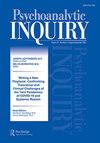Still Alice, Always Elena: New Stories about Dementia
IF 0.5
4区 心理学
Q3 PSYCHOLOGY, PSYCHOANALYSIS
引用次数: 0
Abstract
ABSTRACT As a hospice social worker and tenured professor of Russian literature, I have seen how the stories we tell and re-tell affect how patients, caregivers, and medical professionals live with many different diseases. My essay explores one aspect of this: how the stories we tell about dementia shape our understanding and treatment of cognitive decline. Through an analysis of the novels Still Alice (by Lisa Genova) and The Kukotsky Case (by Liudmila Ulitskaia; English translation by Diane Nemec Ignashev, 2016), I show how telling a story about the possibilities of dementia can help us to reshape our conception of dementia and that, in turn, can change the experience of caregivers, patients, and medical professionals. I argue that fiction can be a powerful agent of transformation, both personal, and, in time, societal. A deep dive into two novels and one condition reveals more than a broader analysis would as these two novels demand close readings. The implications of the essay are larger as I invite medical professionals to think about story and narrative skill in understanding all kinds of disease-and indeed, how “medicalizing” and/or pathologizing conditions such as dementia can work against deeper connections and engagement.仍然是爱丽丝,永远是埃琳娜:关于痴呆症的新故事
摘要作为一名临终关怀社会工作者和俄罗斯文学终身教授,我看到了我们讲述和重新讲述的故事如何影响患者、护理人员和医疗专业人员如何与许多不同的疾病共存。我的文章探讨了其中的一个方面:我们讲述的关于痴呆症的故事如何影响我们对认知能力下降的理解和治疗。通过对小说《依然爱丽丝》(Lisa Genova著)和《库科茨基案》(Liudmila Ulitskaia著;Diane Nemec Ignashev英译,2016年)的分析,我展示了讲述痴呆症可能性的故事如何帮助我们重塑痴呆症的概念,进而改变护理人员、患者和医疗专业人员的体验。我认为,小说可以成为一种强大的变革推动者,无论是个人的,还是社会的。深入研究两部小说和一个条件,会发现这两部小说需要仔细阅读,而不是更广泛的分析。这篇文章的意义更大,因为我邀请医学专业人士思考故事和叙事技巧,以理解各种疾病,以及如何将痴呆症等疾病“医学化”和/或病理化,以对抗更深层次的联系和参与。
本文章由计算机程序翻译,如有差异,请以英文原文为准。
求助全文
约1分钟内获得全文
求助全文
来源期刊

Psychoanalytic Inquiry
PSYCHOLOGY, PSYCHOANALYSIS-
CiteScore
1.00
自引率
33.30%
发文量
65
期刊介绍:
Now published five times a year, Psychoanalytic Inquiry (PI) retains distinction in the world of clinical publishing as a genuinely monographic journal. By dedicating each issue to a single topic, PI achieves a depth of coverage unique to the journal format; by virtue of the topical focus of each issue, it functions as a monograph series covering the most timely issues - theoretical, clinical, developmental , and institutional - before the field. Recent issues, focusing on Unconscious Communication, OCD, Movement and and Body Experience in Exploratory Therapy, Objct Relations, and Motivation, have found an appreciative readership among analysts, psychiatrists, clinical psychologists and a broad range of scholars in the humanities.
 求助内容:
求助内容: 应助结果提醒方式:
应助结果提醒方式:


